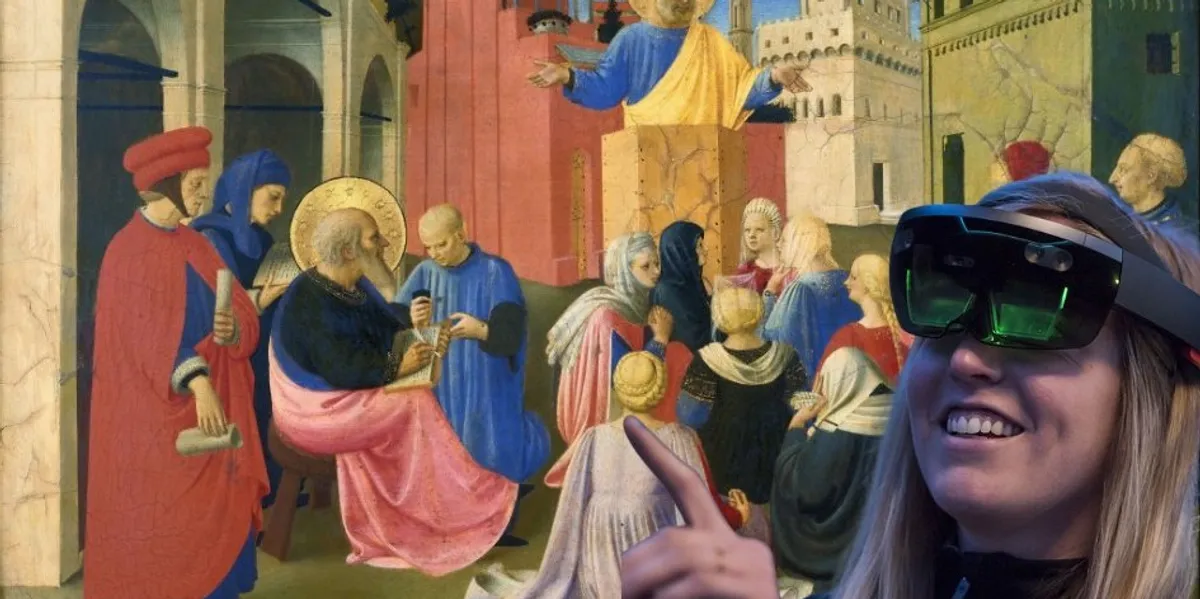AI is devouring everything, from brainpower and manpower to art and writing to therapy and intimacy. Little surprise that now it’s coming for religion — not just as a tool but as a substitute. In this brave new world of prompts and replies, faith might well become just another field for automation to ransack and repackage.
Magisterium AI is a chatbot ready to dispense Catholic answers at machine speed, trained on 27,000 Church documents. Clarity, consistency, and convenience, delivered without delay? What’s not to like?
The Church has long warned against idols. This one just happens to run on silicon.
But something essential disappears in the process. A religion sustained by ritual, mystery, and human encounter is now being reformatted into AI-generated responses. Some see it as innovation, but any truly faithful Christian should see it as reduction. You don’t deepen the soul by outsourcing it to a language model. You dilute it. You deform it.
Digital discernment
Magisterium AI is marketed as a bridge to the Church, but its architectural form avoids the sacred terrain of actual spiritual formation. It offers the comfort of instant answers, devoid of the discomfort that makes those answers matter. No long silences. No wrestling with doubt. No waiting for grace. Just neatly packaged responses dressed in ecclesial jargon. It tempts the user into embracing the illusion of understanding without the weight of discernment.
There’s a reason spiritual growth has always been slow. The methodical journey isn’t a bug; it’s the entire point. Silence teaches. So does uncertainty. So does struggling through Scripture with someone who’s carried the weight longer than you. What is efficient by the measure of this world is inadequate by those of the next. Magisterium AI points to a false path where tension dissolves into trivia and struggle gives way to search results.
This isn’t about resisting technology as a whole, but about recognizing the sharp limits of machines in matters of the soul. An algorithm can refer to documents, but it cannot know God. It cannot console, confront, or call you to conversion. It cannot listen with compassion, hold silence with you, or challenge your ego in ways that leave you undone. It can only simulate presence, and that simulation becomes dangerous when people mistake it for real guidance — or somehow an improvement on real guidance.
Church as help desk
When young Catholics grow up thinking their doubts can be resolved with a prompt, they’ll begin to treat faith like customer service: Get an answer, move on. But the Church is a body, not a help desk. It breathes through embodied tradition, contradiction, dialogue, and grace. Reduce all that to a robotic response, and the foundation crumbles.
RELATED: China implements new crackdown on Christianity, shut down Bible apps and Christian WeChat
Kevin Frayer/Getty Images
Something sacred vanishes when a priest is replaced with a query. Not because clergy are flawless (far from it), but because they’re flesh and blood. They carry the tradition in tone, gesture, imperfection. Witness, not lines of code, forms their counsel. They may not offer certainty, but they teach how to live with its absence.
Clarity without cost
Magisterium AI doesn’t stutter, pause, or search for words. And that’s precisely the danger. Clarity without cost breeds complacency. In this simulated world, you didn’t earn that insight. You didn’t knock, seek, or beg. You tapped, you clicked, and the program delivered. Catholicism — and Christ — has always asked for more. Church truths aren’t just concepts to recite but realities to absorb. They call for surrender of will, reshaping of heart, and direct contact with mystery.
What’s most troubling is how effortlessly tools like Magisterium AI begin to reshape our image of God, even with the very best of intentions, not through argument or doctrine, but through tone, rhythm, and imitation. Language models can mimic reverence and copy cadence. They might stitch together fragments of theology with stunning fluency. But they don’t believe, and they don’t kneel. They do not tremble before the mystery they claim to speak for.
And yet when they answer in the Church’s voice, people thirsty for spiritual life listen. They begin to confuse fluency with faith, output with orthodoxy. Doctrine so easily becomes branding and God a user-friendly construct: predictable, polite, press-ready.
Ghost in the confessional
The devastating result is a “version” of the divine that’s algorithmically accurate but spiritually vacant and without embodiment at the same time. The worst of both worlds, it’s a sanitized, systematized substitute, unable to inspire holy fear and awe. Instead, its strings of answers sound holy enough to pass but are dead enough to forget. What emerges is not the God of Scripture, who thunders from clouds and weeps in gardens, but a corporate construct, one through whom users understand that the only fearsome and awesome thing around is the machine itself.
Nor does Magisterium AI simply digitize theology. It rearranges discipleship too, shifting the aim from becoming holy to staying informed. It trades the long labor of sanctification for a dopamine stream of quick solutions.
The Church has long warned against idols. This one just happens to glow, have hallucinations, and run on silicon.
Chatbot communion
Spiritual risks this severe bleed swiftly into the culture at large. When the faithful stop sitting with Scripture, stop listening to sermons, and stop debating in basements and parish halls, instead isolating themselves and outsourcing their formation to AI, they lose the muscle memory of communion. The Church kneels before a platform. The body of Christ becomes just another content feed.
No, don’t panic. But do be warned: Magisterium AI may begin as a tool of convenience. But convenience rewires. It strips us of spiritual stamina. It dulls the rituals that once shaped the soul. And slowly, it replaces the relationships that once carried the gravity of grace.
The Church isn’t built on convenience. It’s built on sacred encounters between sinner and priest, reader and revelation, and suffering and meaning. Remove those, and you don’t just soften faith; you shatter it. Faith doesn’t need to be digitized. It needs to be lived, in pews and parish halls — in chapels and candlelit corners where no code can follow and no circuit can reach.
Read the full article here









![Sanders Admits Trump Did ‘Better Job’ Securing Border, Criticizes Biden [WATCH] Sanders Admits Trump Did ‘Better Job’ Securing Border, Criticizes Biden [WATCH]](https://www.rvmnews.com/wp-content/uploads/2025/01/2025.01.29-09.00-rvmnews-679a970437d95.jpg)


